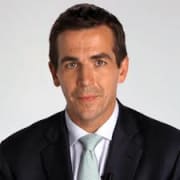Roger Goodell is on Mission to Mend Fences With Players

CHICAGO — The NFL announced its revised policy on touchdown celebrations here at this week’s spring meeting, via an email addressed from Roger Goodell to the fans.
But don’t get it twisted. The message was, implicitly, intended for someone else.
Goodell wrote in the first sentence that, “We use [the offseason] to listen to players.” The third paragraph detailed the work he did in canvassing a cross-section of players on celebrations. The fourth paragraph explained what players told Goodell. The sixth paragraph had more on that. And the seventh and final paragraph thanked the players for their help.
None of it was by mistake.
In fact, as several sources detailed over the past week, it’s all part of a concerted effort by the NFL and the commissioner to start chipping away at the public perception—and to some degree, the reality—that Goodell and the players are perpetually at war.
The strategy? Give the players ownership. Make them know that it’s their league too.
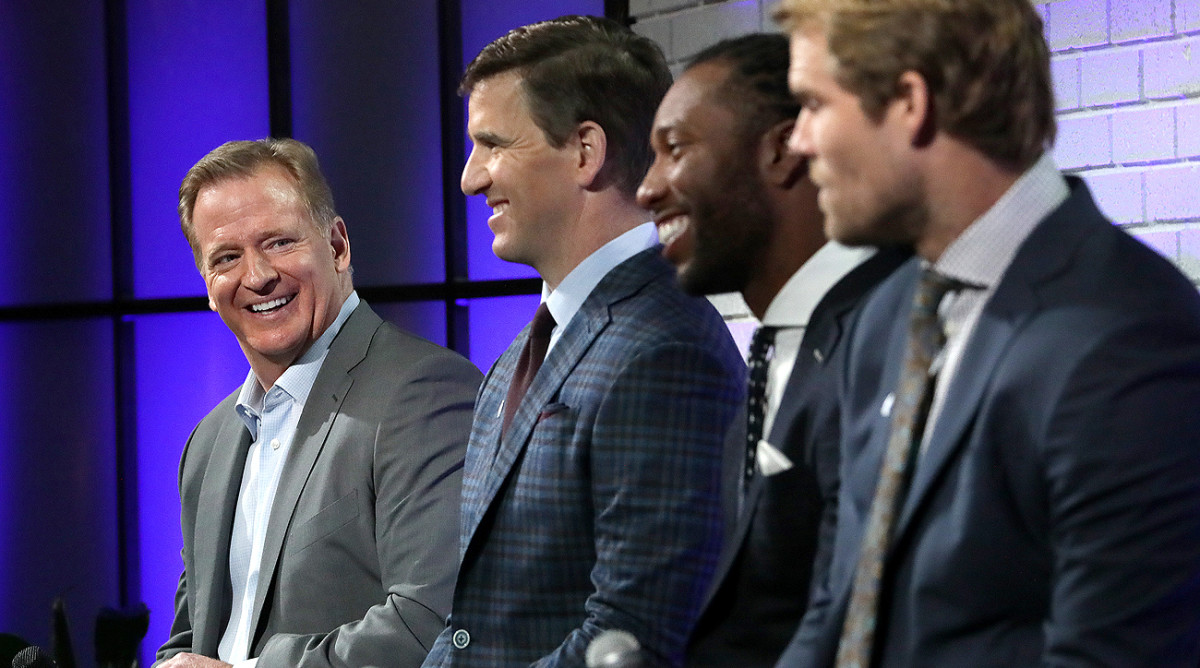
“The commissioner has made an effort to do it,” Giants owner John Mara told me. “Going around and meeting with them on the celebration rule, I think, is just one example. That’s important. We try to engage with them on the competition committee with the rules changes every year. We get good feedback and put a lot of that into effect.
“So I think that’s always important to do that, and I know Roger has made that a priority, and hopefully that’ll pay off for both sides in the end.”
In this week’s Game Plan, we’ll get to Aaron Donald and his fit in the Rams’ new defense; the Kirk Cousins’ contract situation; the years-later aftermath of La’el Collins’ wild draft week; and how the Falcons came to a comfort level with new offensive coordinator Steve Sarkisian, who brings some baggage in his return to the NFL.
• JENNY VRENTAS: Standing Up for Colin Kaepernick
But we’ll start with this story of the 2017 offseason that has gone largely unnoticed. It’s one that could have big ramifications a few years down the line.
And that story really begins with the 2011 lockout, and the dividing incidents since then. There was Bountygate, and the damage done to Jonathan Vilma, Will Smith, Anthony Hargrove and Scott Fujita. There was the referee lockout. There was Ray Rice and the domestic violence mess. There was Bullygate, and the de facto banishment of Richie Incognito. And there was, of course, Deflategate and the hits Tom Brady took.
All the while, the goodwill Goodell had accrued early in his term as commissioner with players like Ben Roethlisberger, Pacman Jones and Mike Vick frayed and, eventually, collapsed altogether. As a result, plenty of guys grew to distrust the league office. Worse, perception has become that all players feel that way.
• NFL LOSES A LEGEND AT 48: Peter King on the legacy of Cortez Kennedy
So now we have an offseason in which there isn’t a major NFL-vs.-players fight, and the league has filled the vacuum by trying to more aggressively rebuild the bridges that were smoldering. And some of that effort has been pretty overt.
In February, at the Super Bowl, Goodell held a fan forum with Cardinals receiver Larry Fitzgerald, Giants quarterback Eli Manning and Panthers tight end Greg Olsen—the three finalists for the Walter Payton Man of the Year award. The event was, as intended to be, well covered by the media.
A month-and-a-half later Goodell invited Giants receiver Brandon Marshall to the NFL’s annual meeting in Arizona to address the owners on the league’s standing with its players. Marshall’s message: “Our relationship could be so much better.”
And then there was the effort to, in essence, let the players write the new rules on celebrations. There were boundaries the league wasn’t going to let them cross, of course. But it was pretty clear in what Goodell said Tuesday during a meeting with a small group of reporters that the new guidelines were basically the sum of what he had gathered in polling players over the preceding weeks.
Goodell declined comment on the overarching effort here. But he clearly has support.
“The players’ perspective is important—we truly are partners in the business,” said Chiefs CEO/chairman Clark Hunt. “And that’s something certainly from an ownership standpoint that we’ve never lost sight of. I think the commissioner’s initiative here in recent years to try and include them more in the decision-making process is a positive. That should serve us both well going forward.
“The benefit is making sure that the players feel like they have input. They’re as important to the success of the NFL as any of the teams are. And I think helping them feel like partners is important.”
The union has taken notice of a few things: 1) how Goodell is taking a lead role in issues (like the celebration-rule research) that may have been delegated to Troy Vincent in the past; 2) the league’s hire of Natalie Ravitz, because of her previous work to improve perception of media mogul Rupert Murdoch; and, 3) how Goodell’s handling of situations like being booed at the draft has improved.
They also know that the NFL tracks his approval rating like he’s a politician, and they know that those ratings haven’t been good this decade. A such, enough of them are skeptical that these sorts of efforts are: A) for PR, and B) pointed toward labor negotiations as the sides creep closer to the collective bargaining agreement’s expiration after the 2020 season.
No matter how you tally the score there, it’s clear the league has a ways to go.
Goodell does have solid relationships with more individual players than perception holds. On Wednesday, when asked about the effort to have players feel ownership in the league, Fitzgerald told me Goodell’s been good about bouncing ideas off him and other current and former players. “All we want is to grow the game and make it better for generations to come,” Fitzgerald says. “The commissioner sees that.”
Conversely, Goodell’s credibility gap with the larger group remains. As one player put it, over the past six years, the lockout has become a “living thing,” growing with the brush fires since, informing the players that the commissioner works for the owners and not them. That implies, too, that there are limitations to where this relationship can go.
But that doesn’t mean it can’t be better. And what we’ve seen, quietly, over the past few months, is the league agreeing that it should be better.
* * *
FIRST AND 10
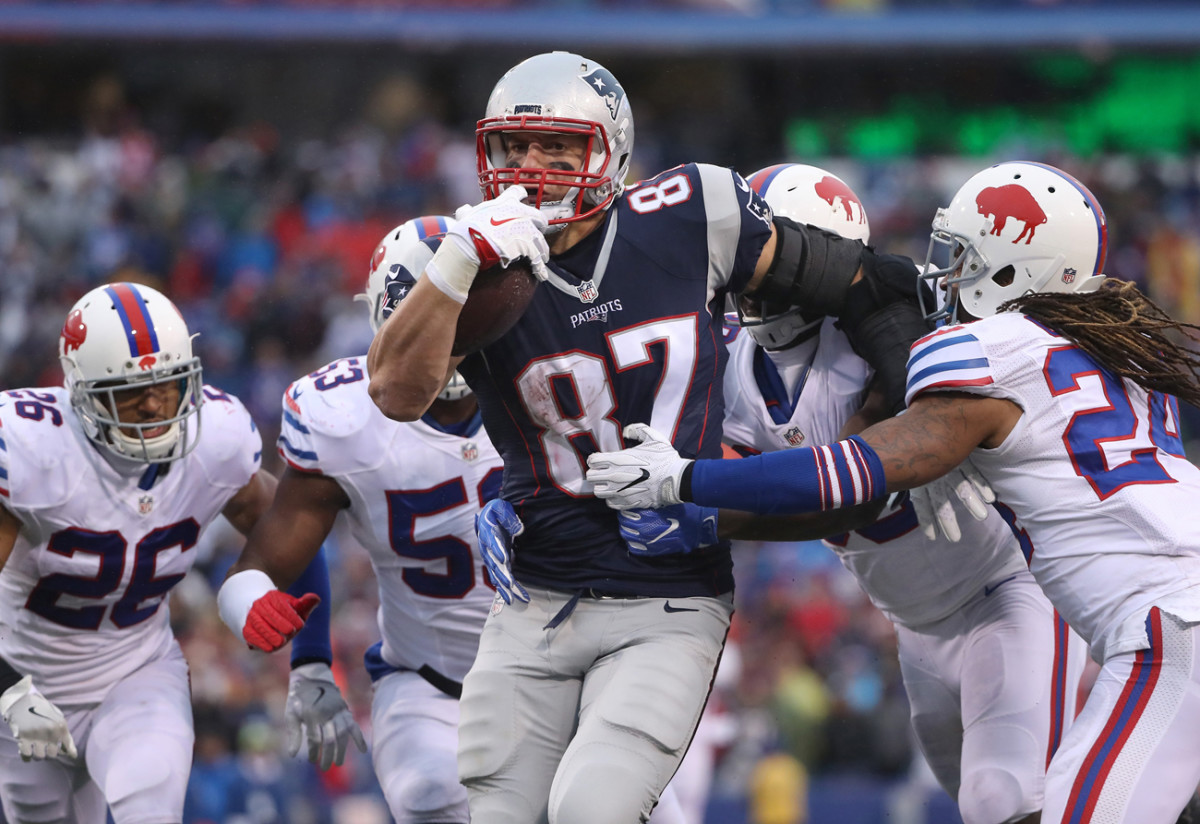
1. Good on the Patriots for doing the right thing and rewarding Rob Gronkowski, a great player who’s remained a model teammate and worker through all the terrible injury luck he’s had. That kind of move—restructuring his contract to create incentive to play all 16 games and return to otherworldly form—reverberates in the locker room.
2. While we’re there, Andrew Hawkinsis a great fit in New England for a lot of reasons. The question will be whether or not there’s room for him in the receiving corps when the Patriots cut down the roster. In the end, it may be him vs. Danny Amendola for a job.
3. Yes, the Dolphins have been impressed with the work of former first-round receiver DeVante Parker. Combine that with Kenny Stills’ new contract, and it at least makes you wonder how far they’ll be willing to go to keep Jarvis Landry.
4. I’m inclined to believe Raiders owner Mark Davis when he says he wants to stay in Oakland through 2019. The team and Davis haven’t taken the hits to their rep that relocating teams usually do. I think Davis would like to keep it that way.
5. Another reason to stay—UNLV’s Sam Boyd Stadium needs a lot of work to be NFL-compliant. It’d be expensive. And UNLV’s going to the Raiders’ stadium in 2020, so it may not make sense to pour cash into a soon-to-be-vacant venue.
6. Doesn’t sound like the Cowboys are doing much to make their 2017 edition “Dak Prescott’s team.” My sense is that’s because they don’t think it’s necessary after the leadership the quarterback showed as a rookie.
7. Odell Beckham’s five-year, $29 million contract with Nike got my attention, because normally those shoe deals are reserved for basketball players. By comparison, the football deal he’s currently on: four years, $10.36 million.
8. Vikings staffers last year would show concern in how aggressive Mike Zimmer was in getting back to work following his eye surgeries, something that obviously affected his recovery. Here’s hoping he takes his time now after another eye surgery.
9. If the NFL wants to players to show up for the Pro Bowl—which is already a challenge—keeping it in Orlando might not be a savvy move. Part of the lure of playing in the past was it became a Hawaiian retreat for the NFL elite.
10. The Rams didn’t fight losing Super Bowl LV, and the reason is simple: Their focus is on hosting Super Bowls, plural. Remember Dallas’s problems in 2011? Despite having the league’s most opulent stadium and powerful owner, the NFL still hasn’t come close to putting the big game back there.
• THE MMQB ROUNDTABLE: Four writers discuss the impact of the new OT
* * *
FOUR DOWNS
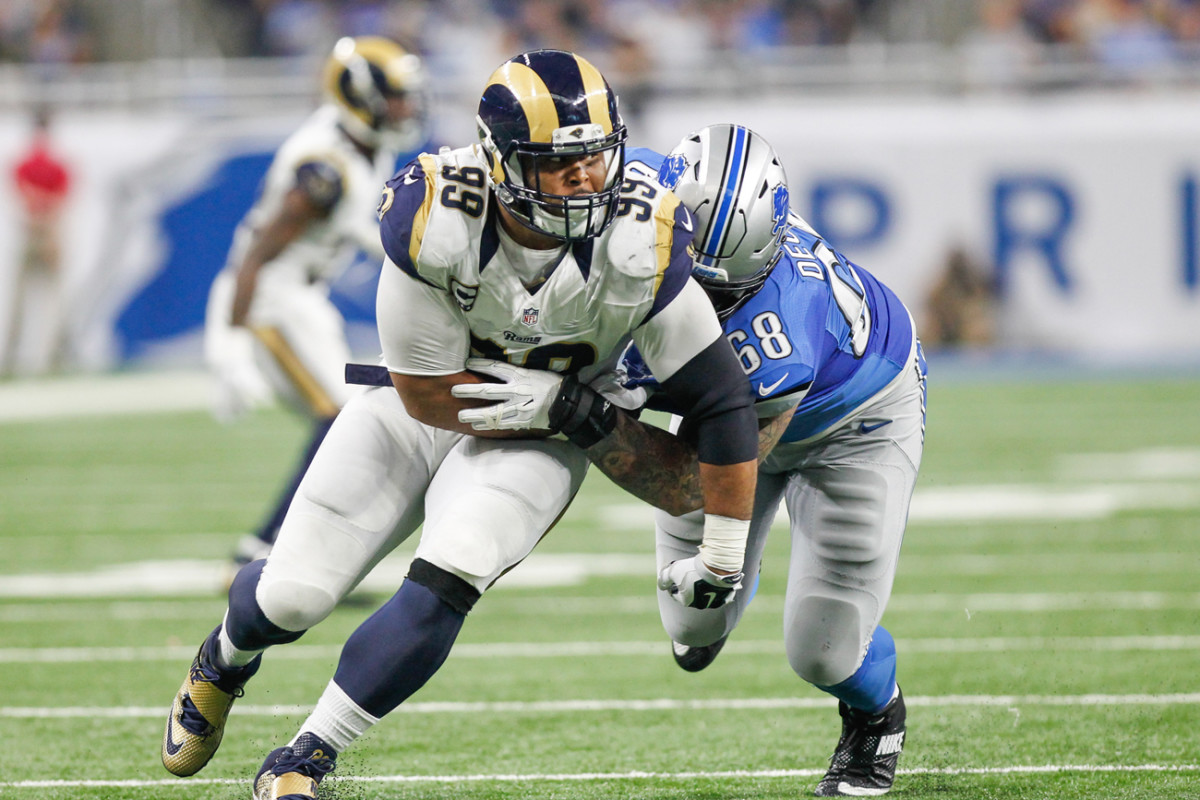
1. Aaron Donald’s fit with new Rams coordinator Wade Phillips. For now, the Rams’ best player—interior game-wrecker Aaron Donald—is staying away from the team’s offseason program. GM Les Snead told the local media that his contract is the reason why, and as I understand it, doing that contract is as much a priority for the team as it is for the player. The real question is whether it lands in the Muhammad Wilkerson/Fletcher Cox range ($17 million per), or in Ndamukong Suh/Von Miller territory ($19 million per), so that part of it, to me, is a relative non-story.
I think what’s more interesting, if we assume Donald will be back in time to be ready for 2017 (he will be) and will be a Ram for the foreseeable future (he will be), is how he’ll fit playing in a 3-4 front for the first time in his career. And to this question, new coordinator Wade Phillips answered to me a while back, “everywhere”. What did he mean? Phillips was saying that Donald is a player who you fit a scheme, and not the other way around. But more than just that, there was an opening there to flip the notion that all 3-4 defenses are created equal.
The truth is there are certain fronts that Donald wouldn’t be ideal. The old read-and-react 3-4 usually demands tall, long athletes to play the 5-technique end spots and outsized nose tackles to anchor the middle, and Donald, at 6-foot and 284 pounds is neither, and using him as a hold-your-ground linemen wouldn’t be the best use of his talent. But Wade’s scheme isn’t like that. It attacks, and gets players upfield, and doesn’t require linemen to hold blocks like Dick LeBeau or Bill Belichick 3-4 defenses of the past would. “He’s one of the best players in the league,” said one scouting director of Donald. “And he’ll still be a 3-technique in that scheme. So there won’t be much different. There are attacking three-down looks there, it’s not a ‘read’ defense.”
Now, what’s interesting is the name Phillips invoked to me when we discussed how Donald fits—JJ Watt. Well, Watt won a Defensive Player of the Year for Phillips. And then, Watt got a big new contract before his first season playing in new coordinator Romeo Crennel’s more traditional 3-4. Watt responded with two more Defensive Player of the Year awards. He was a good enough player to make it work both ways. And Donald will be just fine—and probably pretty rich—when the season starts.
2. The upshot of new overtime. Bill Belichick used to bring up a pretty interesting idea for modifying overtime—and it was to take sudden death, and go the other way entirely by setting a finite time and playing a whole period out. He’d raise the idea when college OT came up. He didn’t like the college overtime because it didn’t closely enough resemble regulation, by marginalizing special teams. Similarly, sudden death would marginalize the element of the clock.
“When it’s first team to score, or however the rules are set, or the way it is in college, that’s not the end of the game,” Belichick told WEEI in 2012. “It’s like basketball, you go and play basketball it comes down to the end of regulation, you’re making three-point shots, you’re fouling to get the ball back. OK, great, so now you’re in overtime. It’s the same thing (with a set clock). You get that same strategic element at the end of the basketball game. In football, we’ve lost that with the rules that we have now.” Asked what he wants, Belichick shot back, “Put some time on the clock and play. ... Play to the end of the game. Put 10 minutes, eight minutes (on the clock), whatever we decide.”
So the NFL isn’t there yet, but cutting the OT to 10 minutes is certainly a step in that direction. Is health and safety an element here? Sure. Is keeping games in a manageable timeframe also part of it? Absolutely. But as I’ve heard, what Belichick has wanted forever—to make the clock a factor in OT—is in play as well. If you’re asking me, I like it, because it adds another layer of strategy to the drama of the extra period.
• BUSINESS OF FOOTBALL: Andrew Brandt on the case for getting rid of OT
3. La’el Collins is winning a bet.Sometimes, things just work themselves out. Two years ago, LSU tackle prospect La’el Collins landed in the middle of a murder investigation during draft week, taking him from borderline first-rounder to toxic overnight. He was exonerated, and now Collins is working on switching over to right tackle after emerging as a rock for the Cowboys at left guard before he was hurt last year. Moreover, he’s doing it with a chance to cash in, and that’s thanks to the strategy he and his agents used in 2015.
After Collins slipped through the first round, his agents worked to get word out through the media that if he wasn’t drafted that Friday night, during the second or third round, and some team took him that Saturday, in the fourth or fifth or sixth or seventh round, then he’d refuse to sign and re-enter the draft in 2016. The idea was to ensure Collins would go undrafted, because then he could pick his team and their analysis showed that he could make up for what he’d lost that way. How?
Drafted players have to sign four-year deals, and can’t sign long-term deals until after they’ve been in the league for three years. Conversely, college free agents can negotiate three-year deals, are eligible to do long-term deals after just two seasons, and can make up money on the back end as restricted free agents. The research showed that if Collins received the first-round tender in 2018, he’d wind up with a four-year total of about $6.7 million. If he was tendered at the second-round level, his four-year take home would be around $5.5 million. By comparison, Giants safety Landon Collins, the 33rd pick in the 2015 draft, did a four-year deal worth $6.13 million, with a chance to make an extra couple hundred thousand off the performance pool. Falcons CB Jalen Collins, the 42nd pick in that draft, did a four-year, $5.4 million deal.
So of all three Collins players—confusing, I know—Jalen and Landon have to wait until next January to do extensions, while La’El can do one today. So two years after being in a pretty bad spot, if La’El Collins has a strong 2017, he’ll wind up benefitting big-time as a result of the way he and the people around him reacted to it.
4. Sark attack in Atlanta.Lost in the unending questions about Atlanta’s Super Bowl collapse is probably one of the more interesting storylines on the horizon for 2017—the NFL’s highest-scoring offense is replacing its coordinator and most of his staff this year. Kyle Shanahan is off to San Francisco, and in his place is former Washington and USC coach Steve Sarkisian, who last coached in the NFL in 2004 and had an alcohol issue that led to his ouster from the Trojans just 19 months ago. This week, we had Falcons GM Thomas Dimitroff on my podcast (it will go live Friday), and we went through a wide range of topics. One of them was Sarkisian’s hire, and how the relationship Dimitroff, assistant GM Scott Pioli and coach Dan Quinn have with Alabama coach Nick Saban—a former co-worker of all three and Sarkisian’s boss in Tuscaloosa—played a part.
“Sark’s been very open to our organization, to the fan base, to our players in general. He wants to talk about it. He doesn’t want to avoid it,” Dimitroff told me. “It’s an issue he’s had to deal with, and an issue he’ll always have to deal with. I think he’s a mature guy, and we’re encouraging him. Dan’s an encouraging person in general and he cares about his staff. We’re not an organization that sweeps things under the rug, we address things as they are. And the great thing is he’s open to being very candid. He knows he’s going to have to face challenges, and we’re there for him to support him. … He has so much to offer our organization. And we all have things we’re dealing with, some more challenging than others. We’re going to be there for him, we’ll continue to support him, and hopefully we can return to being a prolific offense under his guidance.”
Dimitroff also explained how Sarkisian’s creativity, intelligence, personality and familiarity with the scheme Shanahan ran were integral to the decision to pick him over Chip Kelly and others to fill those awfully big shoes. And Dimitroff also talked about why the 2017 roster looks to be the most talented of the 10 he’s put together as Atlanta GM. And yes, we talked about bouncing back from the Super Bowl collapse. Pod goes live Friday.
* * *
OFFSEASON LESSON TO TAKE WITH YOU
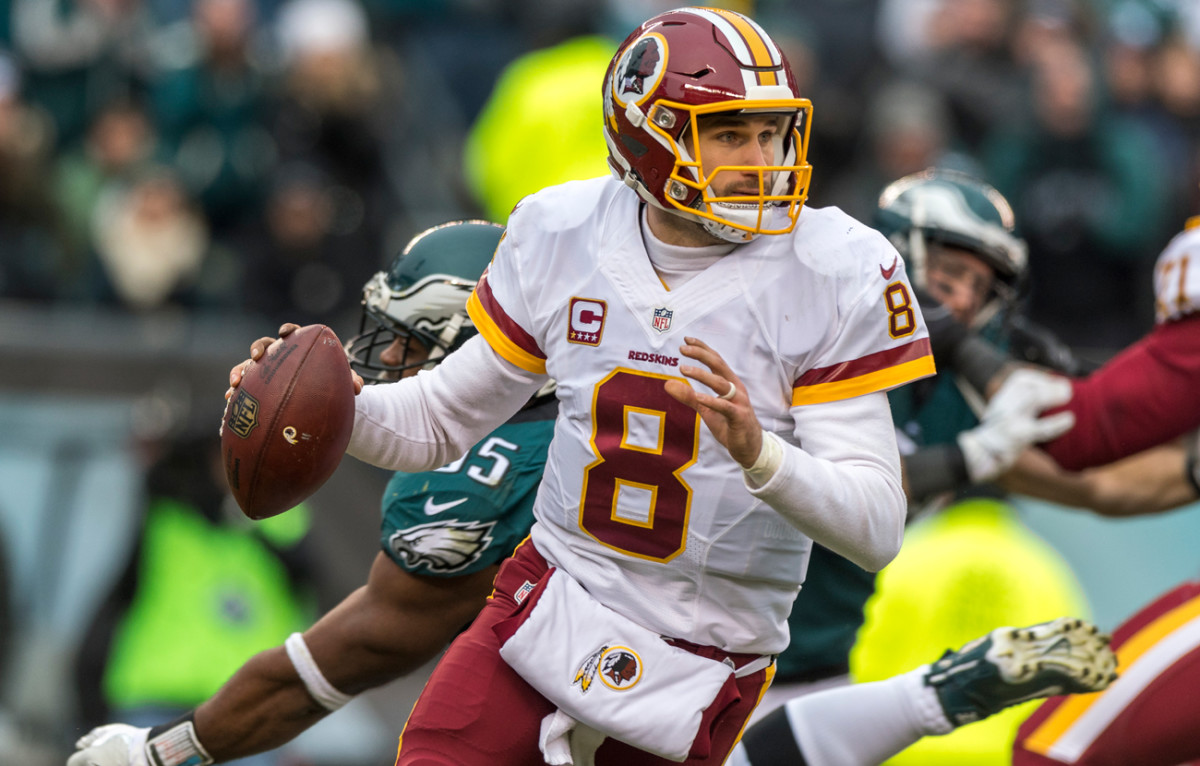
At the end of last season, I asked Redskins coach Jay Gruden what Kirk Cousins had left to prove to show the club’s brass that he was a true franchise quarterback.
Gruden didn’t stutter.
“I don’t know what else he has to do,” Gruden answered. “If you’re talking about statistics and wins, he’s won 17 games in two years, won a division championship, and if you look at his numbers, I just don’t know what else he has to do in the two years he’s had a chance to audition. If you’re looking for progress, he’s made progress. If you’re looking for improvement, he’s improved. If you’re looking for results, he’s given you results.
“He’s not undefeated, no. But he’s put us in position to win a lot of football games. And at the end of the day, when you line up on a Sunday afternoon, does your quarterback give you a chance to win the game? And we feel like he does, and that’s very, very important in this league.”
Cousins has felt that love from Gruden for some time. The difference now? It at least appears now that the rest of the organization feels the same as Gruden. And with the improved across-the-board relationship there, from owner Dan Snyder on down, there’s ground laid for a deal to be done.
So this is where we interject our offseason lesson for this week, and it relates back to our discussion of Derek Carr’s contract last week: With quarterbacks, no matter how good the feelings are between one side and the other, money talks. At no other position is paying a player such a yes-or-no question, and a good first step here is the Redskins moving from maybe (last year) to yes (now).
What does that mean? Last year, the Redskins tried to pay Cousins like a second-tier starting quarterback, when second-tier contracts for established starters don’t really exist, particularly when the player has played out his deal. Acknowledging that reality, the franchise tag gave the team a chance to keep dating Cousins, rather than marrying him. The downside to that? Waiting upped the price on a wedding.
To illustrate it, here are three doors that Cousins could wind up walking through over the next 12 months:
• Door No. 1: Cousins plays out 2017 on the $23.94 million franchise tag, then he’s tagged again in 2018 at $34.47 million. So he’d make $58.422 million between 2017 and ’18 (and $78.38 million from 2016-18), and there’d be no way Washington could prevent him from becoming an unrestricted free agent in March ’19 at age 30.
• Door No. 2: Cousins plays out 2017 on the $23.94 million tag, then he’s transitioned for 2017 by the Redskins at $28.73 million. That sets the floor for him at $52.68 million over the next two years, and $72.63 million from 2016-18. And while the transition tag gives the Skins matching rights, he’d hit the market, giving the 49ers and Kyle Shanahan—and maybe even the Rams and Sean McVay—a shot at doing a blockbuster deal with him without having to send the Redskins any compensation.
• Door No. 3: Cousins signs a long-term deal with the Redskins before the July 15 deadline to do one.
Long story short, the team has to put something behind Door No. 3 that’s enticing enough for Cousins to not want to walk through Door No. 1 or 2. That—and the importance of the position—is his leverage. And that’s why, even as some of the acrimony of last year’s talks have thawed, this one won’t be easy to do, and will likely require a lot of money in the first two years and an outsized guarantee.
The good news is that Cousins has been through this two years in a row. The way his coaches have seen him play through it is proof that the quarterback will handle whatever the outcome is just fine.
• Question or comment? Email us at talkback@themmqb.com.
